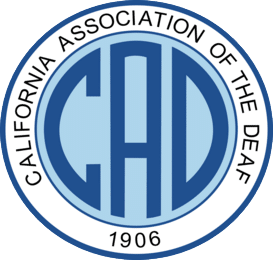
January 19, 2016
Dr. Michael C. Lu, Director
Maternal and Child Health Bureau
Health Resources and Services Administration
5600 Fishers Lane
Rockville, MD 20857
Dear Dr. Lu:
May we ask you – as a physician to remember your Hippocratic oath while reading this letter, more specifically, the oath where you promised to do no harm? California Association of the Deaf (CAD) wishes to file a complaint against one of your grantees, National Center for Hearing Assessment and Management (NCHAM).
NCHAM receives federal funds and is now partners with Hearing First, sponsored by Oberkotter Foundation and Alexander Graham Bell. These are two organizations that would not promote American Sign Language and its people. The web link to Hearing First can be found here:
 http://www.agbell.org/HearingFirst/
http://www.agbell.org/HearingFirst/
Dr. Julia Hecht, a pediatrician who promised to do no harm, said in two of her blogs:
“Language deprivation and consequently brain damage is the single greatest risk to deaf babies and children. I agree with this assertion by Sanjay Gulati, M.D., (Professor at Harvard Medical School)…In my experience, their level of hearing and their ability to speak has nothing to do with what they achieve or how they feel about themselves…What compels families to ignore the facts…and choose the other, risky, disruptive, and even detrimental methods for their (deaf) child? This is where we must shine a light” (Hecht, 2016).
Will you direct NCHAM to refrain from any partnerships with organizations and entities that do harm to Deaf children?
Please direct NCHAM to develop a partnership with a couple of reputable organizations, Language Equity and Acquisition for Deaf Kids (LEADK) (http://www.asl4deafkids.org/) or the American Society for Deaf Children (http://deafchildren.org/).
Please direct NCHAM to refocus its intervention services MAINLY to the provision of language services, usually American Sign Language, English, and the home language to the Deaf child and the family. We do not object to provision of audiological services. However, as a physician who is not supposed to do any harm, you should determine that we cannot wait another four years for NCHAM to revise its goal of ensuring “that all infants and toddlers with hearing loss are identified as early as possible and provided with timely and appropriate audiological, educational, and medical intervention.”
Those kinds of interventions have done nothing to improve the language deprivation syndrome that is common among deaf adults. The syndrome is a byproduct of NCHAM’s ideological bent on audiological interventions.
In an “Ethics Rounds” feature in Pediatrics, Dr. Lantos, another pediatrician, summed up an answer to the question: “Should All Deaf Children Learn Sign Language?”
There are no risks to learning sign language along with spoken language, but there are welldefined benefits (emphasis ours)…this approach seems to be clearly preferable to an approach that focuses solely on oral communication…Children need to learn language. They must learn it from parents, teachers, and their community (emphasis ours). The more languages they learn, the better these children will be able to communicate. (Mellon, et al, 2015)
Your Maternal and Child Health Bureau should take a closer look at the educational outcomes of NCHAM’s disastrous interventional services. Did you know that the academic statistics of deaf students are not widely available – thus we are not able to track the academic and social/emotional outcomes of Early Hearing Detection & Intervention (EHDI), the law that funds NCHAM. That is because most deaf students’ scores are a part of Special Education.
We the Deaf people are the ones who see firsthand the astronomically high cost of language deprivation among our students and within our community. Those people have not received full nor adequate access to either spoken English or a signed language. Neither have they been properly educated, and who thus struggle with socialemotional issues and cultural & identity development.
Humphries et al (2012) emphasized the importance of raising Deaf children with American Sign Language:
The medical profession must protect the health of deaf children by setting a foundational goal of prevention of linguistic deprivation, which can be achieved via sign language. Deaf children need to be given an opportunity to interact with other Deaf peers (i.e. signing children) during their childhood. This ensures that they develop social and communicative abilities. Additionally, for expanded professional and social opportunities, the medical profession can and should also recommend training in spoken language skills. However, such recommendations should never exclude sign language because sign language prevents linguistic deprivation. This is a reliable and implementable remedy to reduce the risk and the harm of linguistic deprivation.
We shall look forward to hearing back from you with an invitation to discuss our concerns with you.
Sincerely,
California Association of the Deaf (CAD) Board of Directors
Julie Rems-Smario, President
Marla Hatrak, Vice-President
Deanne Bray, Secretary
Dodi Ellis, Treasurer
Matthew Sampson, Director of Membership
Shelley Stout, Northern California Director at Large
Kavita Pipalia, Southern California Director at Large
Cc:
HRSA Acting Administrator, Jim Macrae
California Senator Dianne Feinstein
California Senator Barbara Boxer
Senate Education Committee
House of Representatives Committee
California Department of Education Secretary
Department of Education Director
OSERS
California Department of Education
California State Special Schools and Services Division
References
- Hecht, J. L. (2016) Where I Stand. Gaze Shift.
- Retrieved from: http://gazeshift.blogspot.com/p/blog-page_6.html
- Hecht, J. L. (January 8, 2016) Good Advice Often Falls on Hearing Ears. Gaze Shift.
- Humphries, T., Kushalnagar, P. Mathur, G., Napoli, D. J. Padden, C. Rathmann, C., and Smith, S.R. (2012). Language acquisition for deaf children: Reducing the harms of zero tolerance to the use of alternative approaches.
- Harm Reduction Journal http://harmreductionjournal.biomedcentral.com/articles/10.1186/1477-7517-9-16
- Mellon, N.K., Niparko, J.K., Rathmann, C., Mathur, G., Humphries, T., Napoli, D.J., Handley, T., Scambler, S., and Lantos, J. (2015). Should all deaf children learn sign language? PEDIATRICS.






